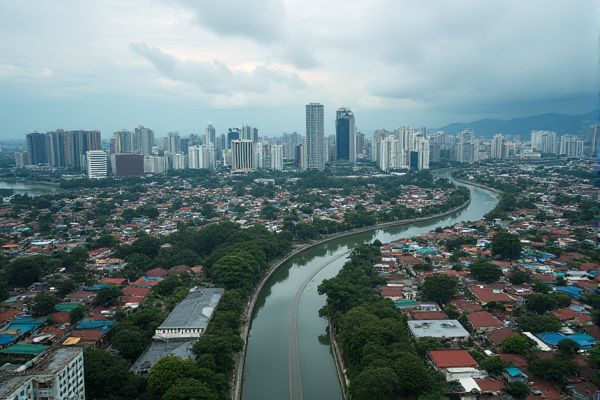
Banking and financial services in Indonesia: Major banking institutions: BCA, BRI, Mandiri, BNI. Online banking and mobile apps widely used. ATM networks: Prima and Alto. Local currency: Indonesian Rupiah (IDR). Foreign exchange services available. Opening hours typically: 8 AM-3 PM. Internet banking requires digital PIN/token. Credit cards are widely accepted. Financial regulations overseen by OJK. Investment options: stocks, bonds, mutual funds.
Major banking institutions: BCA, BRI, Mandiri, BNI.
Major banking institutions in Indonesia, such as Bank Central Asia (BCA), Bank Rakyat Indonesia (BRI), Bank Mandiri, and Bank Negara Indonesia (BNI), offer a wide range of financial services including transaction banking, corporate banking, commercial and SME banking, individual banking, and treasury and international banking. These banks have extensive networks, with BCA serving over 31 million customers through numerous branches and ATMs, while BNI operates a vast number of outlets and ATMs, and Bank Mandiri focuses on digital transformation and global market facilitation.
Online banking and mobile apps widely used.
In Indonesia, there has been significant growth in the adoption of online and mobile banking, with digital penetration reaching 58% and monthly usage of digital banking channels growing twice as fast as in other Emerging Asian markets. Banks have actively promoted digital channels, and consumers are highly open to using Digital Banking Services, although branch access remains relevant due to security concerns and the complexity of some financial products.
ATM networks: Prima and Alto.
ATM Prima and Alto are prominent interbank ATM networks in Indonesia. ATM Prima connects over 80 banks and provides real-time online transactions, including cash withdrawal, balance checks, and inter-bank transfers, through more than 90,000 ATMs. Alto, another major network, handles over 25 million transactions per month, connecting to over 100,000 ATMs and more than 1,000,000 electronic data capture machines, and also employs advanced fraud management solutions to enhance security.
Local currency: Indonesian Rupiah (IDR).
The Indonesian Rupiah (IDR) is the official currency of Indonesia, issued and controlled by Bank Indonesia. It is divided into 100 cents, although high inflation has rendered coins and banknotes denominated in cents obsolete. For more detailed information on its history and significance, you can visit the Indonesian Rupiah Wikipedia page. This resource provides comprehensive insights into the currency's evolution and economic impact.
Foreign exchange services available.
In Indonesia, foreign exchange services are offered by banks such as Bank CTBC Indonesia, providing a range of rates tailored to different transaction volumes. Notably, for transactions below $10,000, banks generally offer counter rates, whereas special rates are available for dealings exceeding this amount. These services encompass today/cash transactions, forward transactions, and option transactions. Clients are required to provide effective funds and submit foreign exchange applications along with necessary supporting documents. For more detailed insights into their offerings, visit the Foreign Exchange Services page on Bank CTBC Indonesia's website.
Opening hours typically: 8 AM-3 PM.
In Indonesia, banking and financial services typically operate during standard business hours, usually from 8 AM to 3 PM, though specific hours may vary depending on the institution and location. The sector is regulated by Bank Indonesia (BI) and the Financial Services Authority (OJK), ensuring that the operations align with national regulations and standards, providing a stable and reliable banking environment for the country's businesses and consumers.
Internet banking requires digital PIN/token.
In Indonesia, internet banking services, such as those provided by CCB Indonesia, require the use of a digital token for secure authentication. Users must activate and set a PIN for the CCBI Token, which generates one-time passwords (OTPs) to access corporate internet banking services and authorize transactions.
Credit cards are widely accepted.
Credit cards in Indonesia, although one of the most popular payment methods globally, have a relatively low penetration rate of about 6%, with around 16.5 million credit cards in circulation as of 2021. [Xendit's](https://www.xendit.co/en/blog/credit-card-payments-in-indonesia/) insights into the landscape reveal that their acceptance is limited compared to other payment methods, indicating significant room for growth and increased adoption in the financial ecosystem of the country.
Financial regulations overseen by OJK.
The Financial Services Authority (OJK) in Indonesia oversees and regulates various aspects of the financial sector, including banking, capital markets, insurance, and non-bank financial institutions. OJK is responsible for ensuring transparency, consumer protection, and the integrity of financial reporting. Its authority has been expanded under the P2SK Law to include supervision over digital financial assets and securities-related financial derivatives. For more detailed information and guidance, you can visit the Global Financial Services Regulatory Guide provided by Baker McKenzie.
Investment options: stocks, bonds, mutual funds.
In Indonesia, investors have several investment options including stocks, bonds, and mutual funds. The Indonesia Stock Exchange (IDX) offers various tools such as the Capital Market School, IDX Virtual Investing, and the Capital Market e-Library to educate and facilitate investments in stocks and other securities. Mutual Funds are also popular, with types including money market, fixed income, equity, and hybrid funds, which are managed by investment managers and provide a range of risk and return profiles.
